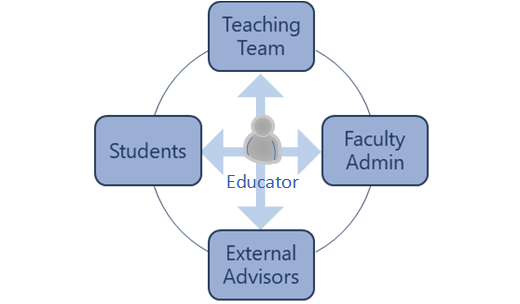Identify the program approval stakeholders
A program approval event features interactions among multiple key stakeholders. It's common to include the program teaching team, students, external advisors, and faculty leadership, as shown in the following diagram:

Teaching team: This team includes faculty educators and other teaching staff who deliver key learning concepts and materials as part of the program. Team members coordinate courses that make up the complete academic program, and they are subject-matter experts in their specific domains. Their expertise is a key enabler of the program’s development and success. Feedback from the teaching team is crucial in designing the program structure, delivery timing, and content.
Faculty administration and leadership: These stakeholders manage the administrative and gatekeeping processes of program development. This team is the first point of contact for faculty educators when they're considering the development of a new program or updating an existing one. Typically, faculty leadership individuals, such as the Head of School, Dean, Pro Vice Chancellor, or Provost, review applications for new program development and decide whether to proceed. Such a decision is often based on alignment with institutional strategy, economic factors, and risk management.
External advisors: These stakeholders are present at the program approval event. They provide feedback and outline any requirements that the program development team must meet. External advisors generally include academic and industry experts in the field of the program. They oversee program development and program validation, including determining whether certain aspects of the program require modification before it is validated. The program development team generally selects the external advisors for the validation event.
Students: Many higher education institutions have student engagement policies that require the involvement of the student body in important institutional activities such as staff recruitment and program development. In the case of program development, students are often involved in the initial planning stages and serve as members of the approval panel, alongside the external advisors. Their role is usually from the perspective of student affairs, providing feedback on components such as assessment strategies and learning materials.